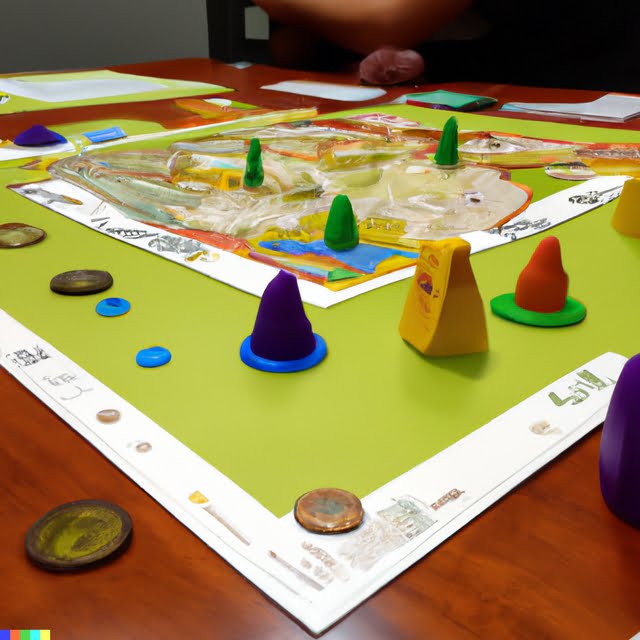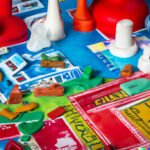Are you searching for engaging ways to teach math skills to children? Look no further than classic board games that teach math skills. From promoting critical thinking and problem-solving to enhancing spatial reasoning and strategic thinking, these timeless games offer a wealth of educational benefits. In this article, we will explore the educational value of classic board games and their significant role in teaching math skills.
When it comes to learning math, traditional methods can sometimes feel dull and uninspiring. However, classic board games offer a fun and interactive way for children to practice and improve their math abilities. By incorporating these games into education, students can develop essential mathematical skills while enjoying themselves.
In the following sections, we will delve into the specific benefits of using classic board games to teach math skills. From understanding money and counting in Monopoly to practicing probability and addition in Yahtzee, these games provide a hands-on approach to learning that can greatly benefit students. Let’s take a closer look at how these beloved games can serve as valuable tools for teaching math.
Benefits of Using Classic Board Games to Teach Math Skills
Classic board games have proven to be effective tools in teaching math skills to children. These games offer numerous benefits that make learning math enjoyable and engaging. Some of these benefits include:
- Developing critical thinking and problem-solving skills: Games like Chess and Settlers of Catan require strategic thinking, planning, and decision-making, which are essential for mathematical problem-solving.
- Reinforcing basic arithmetic and counting: Monopoly and Checkers involve the use of numbers, counting spaces, and making simple calculations, thus helping children improve their arithmetic skills.
- Practicing mental math: Scrabble and Yahtzee encourage players to mentally calculate scores, probabilities, and word values which is beneficial for mental math practice.
In addition to these benefits, classic board games also help children develop a positive attitude towards math by making learning fun and interactive. The hands-on experience provided by these games can enhance understanding and retention of mathematical concepts in a more practical way.
Furthermore, the social interaction involved in playing these games promotes collaboration, communication, and teamwork among players. This not only enhances the overall learning experience but also fosters important interpersonal skills that are valuable for future academic success.
Section #1
Chess has long been recognized as a game that fosters critical thinking and problem-solving skills, making it an excellent tool for teaching math skills. This classic board game requires players to think several moves ahead, strategize their moves, and anticipate their opponent’s next actions. Such mental exercises are essential for developing mathematical skills such as pattern recognition, logical reasoning, and spatial awareness.
The Benefits of Chess in Math Education
One of the primary benefits of using chess to teach math is the enhancement of critical thinking abilities. By evaluating different scenarios and predicting potential outcomes, students can improve their decision-making skills, which are crucial in mathematical problem-solving. Furthermore, chess also teaches patience and perseverance, both of which are important attributes in tackling complex math problems.
Applying Mathematics in Chess
In addition to promoting critical thinking, chess involves mathematical concepts that are fundamental to the game’s strategy. Players must calculate potential moves and evaluate the value of each piece on the board – a form of arithmetic. Moreover, understanding patterns and positioning pieces strategically requires spatial reasoning skills, another key aspect of mathematical thinking. By integrating these mathematical elements into gameplay, students can apply theoretical concepts into practical use while honing their math skills in an engaging manner.
Section #2
Monopoly is a classic board game that offers numerous opportunities for players to practice and develop their mathematical skills. One of the primary benefits of using Monopoly to teach math is the understanding of money, counting, and basic arithmetic. Players are required to handle money, make change, calculate rents, and keep track of their financial transactions throughout the game.
In Monopoly, players learn about the value of different properties, mortgage values, and various financial transactions that can occur during gameplay. This provides an excellent opportunity for individuals to practice addition, subtraction, multiplication, and division as they engage in buying, selling, and managing their properties.
Furthermore, counting becomes an essential skill throughout the game as players move around the board and determine how many spaces they need to advance or pay rent on specific properties. This aspect of Monopoly encourages players to practice mental math as well as incorporating more complex arithmetic calculations when dealing with property development or financial negotiations.
Overall, Monopoly not only teaches practical skills related to money management but also serves as a fun and engaging way for individuals to enhance their mathematical abilities in a real-world context.
| Math Skills Learned | Benefits |
|---|---|
| Understanding money values | Real-world context for math practice |
| Developing counting and arithmetic skills | Practical application of math concepts |
Section #3
Scrabble is a classic word game that not only promotes vocabulary building but also provides an opportunity to practice mental math skills. As players form words on the game board, they must calculate the total value of the letters used to create each word. This requires them to add up the points associated with each letter tile, fostering quick mental math calculations.
In addition to math skills, Scrabble also enhances language and literacy abilities. Players are required to think critically about word formation and make strategic decisions based on the letter tiles they have available. This process encourages problem-solving and analytical thinking while also expanding their vocabulary.
Moreover, Scrabble can be adapted for different levels of math proficiency, making it suitable for a wide range of ages and abilities. Whether played in a classroom setting or at home with family and friends, Scrabble offers an engaging way to reinforce math skills while simultaneously promoting cognitive development and linguistic competence.
Section #4
Classic board games are not only fun to play, but they can also be valuable tools for teaching math skills. Yahtzee is one such game that provides an excellent opportunity for players to practice probability and addition in a fun and engaging way. Here are some of the key benefits of using Yahtzee to teach these important math concepts:
- Probability Practice: Yahtzee involves rolling five dice to create different combinations, such as full house, large straight, or the elusive Yahtzee (five of a kind). Players must strategize and decide which combinations to go for based on the likelihood of achieving them with their next roll. This aspect of the game allows players to understand and apply basic principles of probability.
- Addition Skills: After each round of rolling and re-rolling the dice, players must add up and record their scores in various categories on the scorecard. This requires quick mental math calculations as well as adding multiple numbers together to determine the final score.
Playing Yahtzee can improve mathematical skills by providing practical application in a recreational setting. It offers a hands-on way for both children and adults to work on probability calculations and sharpen their addition abilities while having a good time.
Incorporating Yahtzee into math education can enhance students’ understanding of these concepts in a context that is enjoyable and relatable. Whether played at home with family or introduced in classroom settings, Yahtzee encourages critical thinking, strategic decision-making, and mathematical proficiency in an entertaining way.
Section #5
Settlers of Catan is a popular board game that not only encourages players to strategize and negotiate but also introduces the concept of resource management and basic math calculations. This game provides an excellent opportunity for players, especially children, to understand the importance of utilizing resources wisely and making calculated decisions based on probability and simple arithmetic.
Resource Management:
In Settlers of Catan, players must strategically manage various resources such as brick, lumber, wool, grain, and ore in order to build settlements, cities, and roads. Understanding the value of each resource and properly allocating them is essential for success in the game. By playing Settlers of Catan, individuals learn firsthand how scarcity affects decision making and how to optimize available resources for maximum benefit.
Simple Math Calculations:
The game involves dice rolling to determine which resources are produced each turn. Players must calculate the probabilities of certain numbers being rolled based on the layout of their settlements and cities. Additionally, trading resources with other players requires quick mental math skills as individuals must assess whether their trades are fair or beneficial. Settlers of Catan helps reinforce basic addition and multiplication skills in a fun and engaging manner.
Strategic Thinking:
Furthermore, Settlers of Catan encourages strategic thinking as participants must plan their settlements strategically and anticipate future resource needs. This aspect introduces basic concepts of economics such as supply and demand while promoting critical thinking skills essential for mastering mathematical concepts. Overall, incorporating Settlers of Catan into math education can greatly enhance students’ comprehension of resource management and basic math calculations in an interactive way.
Section #6
Checkers is a classic board game that has been played for centuries and has proven to be an excellent tool for enhancing spatial reasoning and basic arithmetic skills in players of all ages. The simple yet strategic nature of the game requires players to think ahead, plan their moves, and anticipate their opponent’s next move, thereby improving their spatial awareness and critical thinking abilities.
One of the key benefits of playing checkers is its ability to reinforce basic arithmetic skills such as addition and subtraction. Players must constantly calculate the number of spaces they need to move their pieces, count the remaining pieces on the board, and strategize their next move based on these calculations. This constant practice with numbers helps in solidifying fundamental arithmetic concepts in a fun and engaging way.
In addition to honing spatial reasoning and arithmetic skills, playing checkers also encourages social interaction, sportsmanship, and strategic problem-solving. It teaches players to think critically about each move they make while also considering the potential implications for future moves. Overall, incorporating checkers into math education can be an effective way to make learning more enjoyable and interactive for students while also enhancing their cognitive abilities.
Section #7
Backgammon is a classic board game that has been played for centuries and is often overlooked as a tool for teaching math skills. However, this game offers a valuable opportunity to introduce basic probability and strategic thinking to players of all ages. By incorporating Backgammon into math education, students can develop important skills while enjoying a fun and engaging activity.
One of the key mathematical concepts that Backgammon teaches is probability. Players must make decisions based on the likelihood of certain dice rolls, which requires an understanding of basic probability theory. This aspect of the game can help students develop their probabilistic reasoning and decision-making skills, which are crucial in various real-life situations.
In addition to probability, Backgammon also helps players enhance their strategic thinking abilities. The game involves making calculated moves based on the current board state and anticipating potential future outcomes. This strategic element encourages players to think ahead, analyze different scenarios, and make informed decisions – all of which are essential skills in both mathematics and everyday life.
| Math Concept | Skills Developed |
|---|---|
| Probability | Probabilistic reasoning, decision-making |
| Strategic Thinking | Analytical thinking, forward planning |
Conclusion
In conclusion, classic board games offer a valuable and interactive way to teach math skills to students of all ages. By incorporating games like Chess, Monopoly, Scrabble, Yahtzee, Settlers of Catan, Checkers, and Backgammon into math education, educators can create an engaging learning environment that promotes critical thinking, problem-solving, and strategic thinking.
These games not only help students understand mathematical concepts such as probability, addition, subtraction, and resource management but also foster important skills like spatial reasoning and vocabulary building.
Moreover, the use of classic board games in math education promotes social interaction and collaboration among students. It encourages teamwork and healthy competition while providing a fun and enjoyable way to practice math skills. This can lead to increased motivation and interest in mathematics as students see its real-world applications through gameplay.
By recognizing the educational value of classic board games in teaching math skills, educators can create a well-rounded learning experience that goes beyond traditional textbook methods. Incorporating these games into math education not only reinforces mathematical concepts but also enhances critical thinking skills that are essential for academic and personal development. Overall, integrating classic board games into math education is a valuable approach that can benefit students in various ways as they learn and grow.
Frequently Asked Questions
What Board Game Teaches Math?
One board game that is known for teaching math is “Mathopoly.” This game is a math-centered version of the classic game Monopoly, where players have to solve math problems to progress through the game. It helps players practice addition, subtraction, multiplication, and division while also incorporating strategy and critical thinking skills.
What Games Help You With Math?
There are several games that can help improve math skills, such as “Sum Swamp” and “Math Bingo.” These games make learning math fun by incorporating it into gameplay.
“Sum Swamp,” for example, helps children practice addition and subtraction while navigating through a colorful game board filled with obstacles and rewards. “Math Bingo” helps reinforce basic math facts through a bingo-style game format.
What Are the 6 in 1 Math Games?
The 6 in 1 Math Games are sets of educational games that cover multiple areas of math all in one package. These sets often include various games and activities focused on arithmetic operations, fractions, geometry, measurement, time, and money.
By providing a variety of learning opportunities within one set, these 6 in 1 Math Games offer a comprehensive approach to building mathematical skills in children.

I love playing all kinds of games – from classics like Monopoly to modern favourites like Ticket to Ride.
I created this blog as a way to share my love of board games with others, and provide information on the latest releases and news in the industry.





